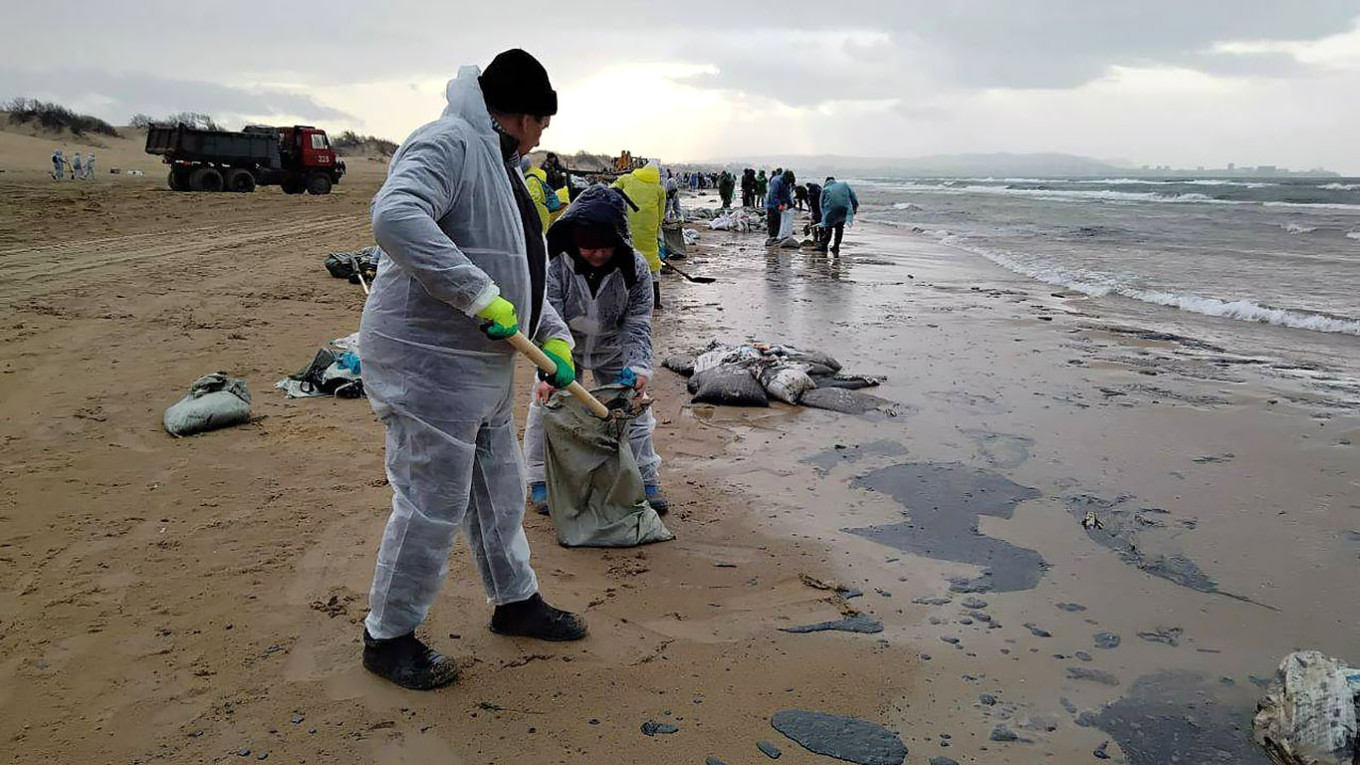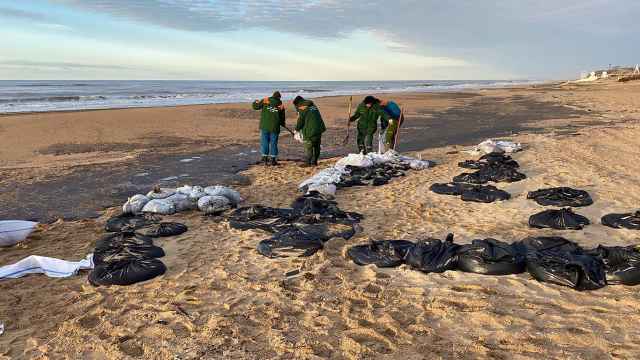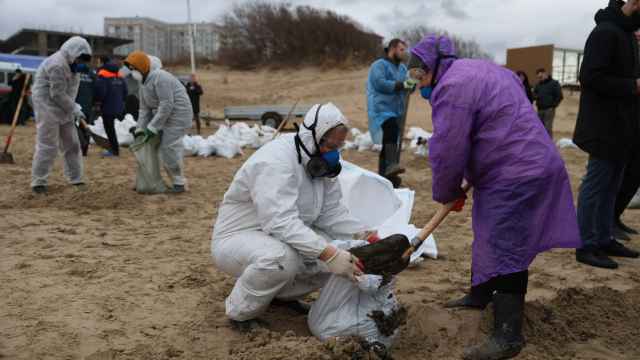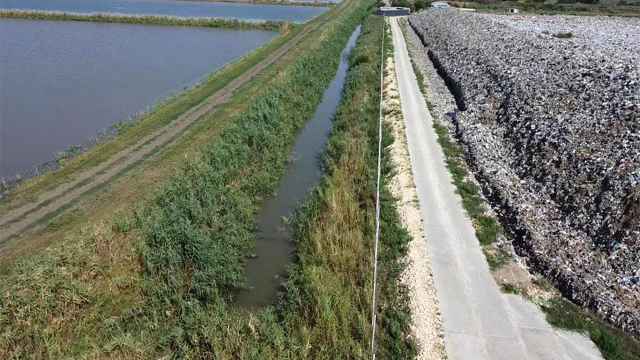A major environmental disaster is unfolding along southern Russia’s Black Sea coast after a storm damaged two oil tankers last weekend, spilling thousands of tons of heavy fuel that has now washed ashore.
In the week since the Volgoneft 212 sank and the Volgoneft 239 ran aground, social media has been flooded with videos showing oil-slicked beaches and sludge-covered birds. As of Monday, around 55 kilometers (34 miles) of coastline in the Krasnodar region were impacted by the spill, emergency authorities said.
While officials have said that emergency crews are working “day and night” to clean up the spilled mazut — a low-grade heavy fuel oil — environmental activists and volunteers involved in cleanup efforts say the government is not doing enough to address the disaster.
“We are pleading for your help. This comes from the bottom of the heart,” a woman who lives in the resort town of Anapa said in a video message addressed to President Vladimir Putin.
“Local authorities are overwhelmed and lack the necessary resources,” the woman continued. “The only resource they have is ordinary people with shovels, but a catastrophe of this scale cannot be fought with shovels alone.”
An emergency response center in Krasnodar said nearly 8,500 people, including Emergency Situations Ministry staff and volunteers, are involved in the ongoing cleanup. Nearly 400 pieces of heavy machinery were also deployed, it added.
Meanwhile, Krasnodar region Governor Veniamin Kondratyev has shared a growing number of photos and videos, sometimes set to dramatic music, where he trudges along oil-splotched beaches and meets with volunteers. In his social media posts, Kondratyev has been keen to highlight cooperation between government agencies, as well as dump trucks and tractors sent to remove oil from the coastline.
But that upbeat official response to the oil spill is taking place in parallel with the self-organized cleanup efforts of ordinary Russians who believe the government is simply not up to the task. In one Telegram group with around 70,000 members, volunteers are coordinating beach cleanups, rescuing animals and raising funds for supplies and protective gear.
A volunteer working near the villages of Veselovka and Blagoveshchenskaya said residents were removing oil from the sand by hand. In some cases, the cleanups along stretches of beach had to be repeated when bags of mazut were not promptly removed, causing them to leak back onto the shore.
“Everything is being done on an individual basis by volunteers,” the volunteer, who asked to remain anonymous, told The Moscow Times. “There is no help from the government. People are doing everything themselves, completely left to fend for themselves.”
The Black Sea oil spill occurred on Dec. 15 when a violent storm split the Volgoneft 212 tanker in half and ran the Volgoneft 239 aground. One crew member died from hypothermia, while 26 others were rescued.
Together, the two Russia-flagged tankers were carrying around 9,200 tons of mazut fuel oil, with an estimated 40% spilling into the sea. During his annual press conference on Thursday, Putin blamed the tankers’ captains for the accident, saying that law enforcement authorities believe they ventured out to sea without authorization.
By Monday, the Emergency Situations Ministry said cleanup crews had collected over 17,000 tons of contaminated sand and soil, inspecting 24 square kilometers of affected waters, and rescuing more than 970 birds.
However, environmentalists also reported a mass die-off of dolphins, likely linked to the spill and called for investigations to determine the cause of death.
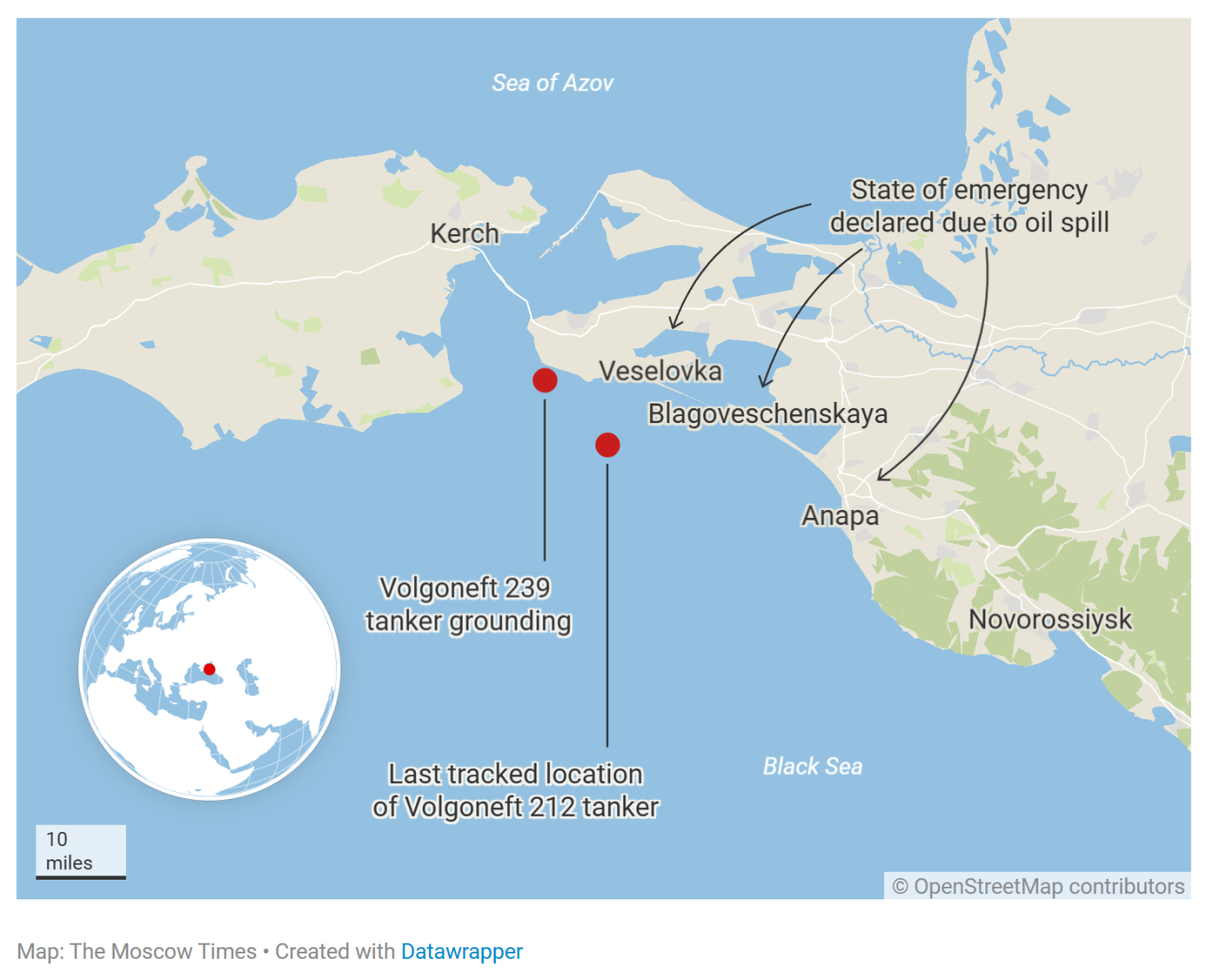
Researcher and eco-activist Eugene Simonov, an expert with the Ukraine War Environmental Consequences Work Group, emphasized the ecological risks but also noted a lack of transparency from the Russian authorities.
“The spill is larger than any we can recall on the Black Sea, yet there is no comprehensive information on its size and consequences,” Simonov told The Moscow Times. “This is largely because, instead of recognizing the scale of the disaster and declaring a federal emergency, the authorities chose to declare an emergency only at the municipal level.”
Simonov said the decision to designate the oil spill as a local emergency is hampering the government’s response.
“Local authorities lack the resources to address the situation — there aren’t enough human resources, specialized equipment or trained experts to manage the cleanup, which requires specific expertise,” he said.
Volunteers have shared similar concerns.
“After two hours of cleaning, you feel sick because you’re breathing in [the pollution],” the volunteer from earlier said, adding that they felt nauseous for two days after helping clean up beaches. “Activists are forced to buy protective equipment, including respirators and cleaning supplies.”
Simonov warned that unremoved oil from the sunken ships poses ongoing risks.
“Volgoneft 212 still holds half its oil underwater, according to reports, and while divers have inspected it, no effort to pump it out has been made,” he said. “Volgoneft 239, lying just 80 meters from shore, could also be pumped, but nothing has been done.
“Even if it’s not leaking now, it could after the next storm. Swift action is essential to prevent further contamination,” Simonov added.
Russian media estimate the environmental damage at between 30 and 50 billion rubles ($298-497 million). Environmentalists warned that up to 30,000 water birds could perish as a result of the pollution.
“Mazut is a poison,” Simonov said. “Birds coated in mazut begin to freeze and become unable to fly. Marine life suffers similarly, as mazut poisons their skin or disrupts their breathing.”
“Trying to clean themselves, animals become poisoned by this toxic substance. Mazut also forms a film on the water’s surface, blocking oxygen and halting gas exchange, which threatens aquatic life. Additionally, mazut sinks to the seafloor, contaminating benthic ecosystems.”
Governor Kondratyev on Monday vowed to completely rid the beaches in his region of mazut no later than March 1. However, experts say fully addressing the impact of the spill could take much longer.
Based on previous incidents, such as a 2007 Black Sea spill that released 3,000 tons of mazut, Simonov predicted the cleanup could take months or years.
“Optimists might say two years [to clean up the spill], pessimists — longer,” Simonov said. “For now, it’s pure speculation. Mazut decomposes slowly, so there’s nothing optimistic about it.”
A Message from The Moscow Times:
Dear readers,
We are facing unprecedented challenges. Russia's Prosecutor General's Office has designated The Moscow Times as an "undesirable" organization, criminalizing our work and putting our staff at risk of prosecution. This follows our earlier unjust labeling as a "foreign agent."
These actions are direct attempts to silence independent journalism in Russia. The authorities claim our work "discredits the decisions of the Russian leadership." We see things differently: we strive to provide accurate, unbiased reporting on Russia.
We, the journalists of The Moscow Times, refuse to be silenced. But to continue our work, we need your help.
Your support, no matter how small, makes a world of difference. If you can, please support us monthly starting from just $2. It's quick to set up, and every contribution makes a significant impact.
By supporting The Moscow Times, you're defending open, independent journalism in the face of repression. Thank you for standing with us.
Remind me later.



